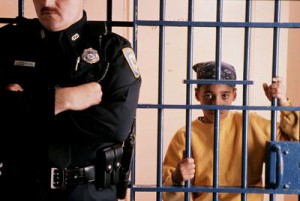When Kids Commit Adult Offenses
 Perhaps one of the most disheartening aspects of the American criminal justice system is when children and teenagers are a part of it. A juvenile crime is defined as a crime committed by any person under the age of 18. Juvenile delinquency cases pose a unique problem because often times the teenager is unable to fully appreciate his or her actions and there is a major concern that to over-penalize these offenders for their actions will irreparably harm their development.
Perhaps one of the most disheartening aspects of the American criminal justice system is when children and teenagers are a part of it. A juvenile crime is defined as a crime committed by any person under the age of 18. Juvenile delinquency cases pose a unique problem because often times the teenager is unable to fully appreciate his or her actions and there is a major concern that to over-penalize these offenders for their actions will irreparably harm their development.
A recent article in the New York Times talks about the problems with the traditional adult sentencing structure for teens and how the city is working to find creative rehabilitative solutions to the problem. Juvenile prisons have become a place of “violence, broken bones, suicidal behavior, and deficient mental health services.” Judges are looking to alternatives such as probation, house arrest, and relocating children to child welfare agencies and foster homes. There is also an educational concern when juveniles are placed in prison.
A recent LegalMatch study revealed the other side of the coin- that these juveniles have a very real possibility of being tried as an adult with adult consequences to their actions. Some factors that determine whether to try an offender as a juvenile or as an adult include: the type of crime committed, the extent of injury or damage, attitude of community and court toward this type of crime, prior convictions, whether or not a weapon was used, family circumstances, and the mental health of the minor.
For example, in California a teenager as young as 14 can be tried as an adult if he or she committed a serious crime such as murder, armed robbery, or rape. To date, the youngest child to be in an adult trial is 12 year old Jordan Brown. Jordan is charged with the murder of his father’s fiancé who was also eight months pregnant at the time of her death. Pennsylvania does not have a minimum age for adult charges, and if convicted Jordan will face life in prison without the possibility of parole.
I think this is a really interesting aspect of crime and punishment. On the one hand, there is the need to deter and make sure that the streets are safe from crime whether it comes from an adult or from a child. On the other hand, because of the child’s age and immaturity, the type of punishment imposed has such a tremendous impact on the rehabilitation (or lack thereof) of the child and can ensure that future instances do not happen again.
In my opinion, because of the deficiencies in prison, I respect the approach that New York and many other states are taking to the problem in trying to find alternatives to the typical punishment. It will be interesting to see how effective alternative punishment is many years down the road for these troubled teens.

Comments